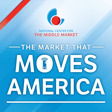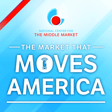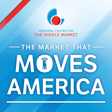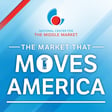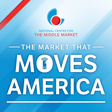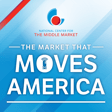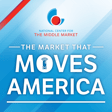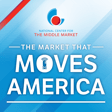Become a Creator today!Start creating today - Share your story with the world!
Start for free
00:00:00
00:00:01

The Power of Great Advertising
In this episode, we sit down with John Drake, President of Drake Cooper and discuss advertising and brand recognition for middle market companies. Drake shares his insight on how to make your brand memorable, how marketing can improve your ROI, the natural advertising advantage mid-size companies have, and how to utilize it.
Drake Cooper, founded in 1978 is an employee-owned advertising agency. They work with clients from around the country and specialize in working with mid-size brands by tailoring their services to be of maximum value to organizations of 10M-1B.
Transcript
Introduction to Middle Market Focus
00:00:02
Speaker
Welcome to The Market That Moves America, a podcast from the National Center for the Middle Market. The center is the leading source of knowledge, leadership and innovative research on the middle market economy. Throughout our podcast, we will feature middle market leaders and stakeholders to hear their real world perspectives on trends and emerging issues.
Scaling with Strategic Brand Management
00:00:22
Speaker
Brand awareness is vital to business performance. Listen to hear from an expert on how a strategic approach to brand management and advertising can help scale a middle market business. Welcome to The Market That Moves America.
John Drake on Marketing for Mid-Sized Companies
00:00:36
Speaker
Today's podcast is a discussion on marketing, advertising, and brand recognition for mid-sized companies. And joining me today from Drake Cooper is John Drake, president of the company. Welcome, John. Hello, Doug.
00:00:49
Speaker
So yeah, thanks for your time. Thanks for joining me today. Looking forward to this conversation.
Insights from John Drake's 27 Years in Advertising
00:00:55
Speaker
So if you could, why don't you just start by telling me a little bit about your background, your experience, and your current role with Drake Cooper. Certainly happy to, and thanks for having me. My career is in advertising, and I've worked in advertising agencies for 27 years now.
00:01:14
Speaker
Which is a really interesting field because you work with so many different companies on their brand and their story and what they're doing with their customers so it's been a really it's been a really fun twenty seven years so far and and
00:01:29
Speaker
I started working directly with clients on the day-to-day needs when I started my career and then switched into strategy roles as the years went on. Started off working with Nestle and Disney, which are wonderful brands to start on because you really learn the fundamentals of good business and brand management.
Drake Cooper's Core Disciplines Overview
00:01:47
Speaker
And then over the years, working on other brands and some of the ones that listeners might be more well aware of are Direct TV, Mitsubishi, Baskin Robbins, which was quite fun, Microsoft, Carl's Jr., Tillamook, UCLA, and then work with Funko, which is pop culture and fandoms and Path, which is global health.
00:02:09
Speaker
And now today, I'm president of Drake Cooper. And I'm responsible here at the agency for ensuring we've got six core disciplines that we offer for clients. And I'm in charge of making sure that each of them are performing at a strong level. And then they work well together. And those are creativity, which is what you might expect from an advertising agency with writing and design and photo, video, and then strategy, media planning and buying, something that we call UX and technology, data analytics, and MarTech.
00:02:41
Speaker
Awesome.
Understanding Drake Cooper’s ESOP Model
00:02:42
Speaker
So, Drake Cooper is an employee-owned business, correct? We are. Yeah, tell us a little bit about how that model works and maybe some of the advantages that you see and just like any advice for listeners out there who may be considering, you know, structuring their own companies that way. I think it's
00:03:01
Speaker
It's a little bit unusual to find companies that are like that, so I'd love to hear a little bit more from your experience. It is unusual and certainly happy to share that. Numbers vary, but it's pretty safe to assume that less than 5% of companies out there are what's called an ESOP.
00:03:17
Speaker
which is employee owned. And so we're 100% employee owned. We did this a couple of years ago. We found that the benefits of it, it's been pretty cool. There's really no mystery about profit. We're not trying to do anything for Wall Street and there's no
00:03:32
Speaker
private owners, you know, the profit is everyone makes thoughtful choices because every employee here shares in the profit. So it's really nice for everybody to know that everybody's contributions, it all goes into one area. And then it's really helpful for leadership, myself and Mindy Stomp, our CEO, where it's like we need to, we have an obligation to grow the value of our stock only for employees so that when they,
00:04:01
Speaker
leave the company or retire, they've got an additional amount that comes from their share of stock when they get out. And so it's a really great way to run a business and to work with people, especially with doing creative things.
00:04:18
Speaker
Yeah. And I would have to guess that's something that can serve as a really good draw when you're trying to attract talent or a differentiator, I should say, with somebody who may be considering joining your company and you can offer something like that up. There's two things that we found recently, Doug. You're exactly right. The first is recruiting because when we talk to people about joining, one of the things
00:04:41
Speaker
that we say is like it's you're really a part of something here and you can really see your mark in the company and you're working like the work that you put in, it works to grow your own sort of fund. And it really just keeps things on a really, really cool level day to day. Sure, I can imagine.
Brand Management Across Business Sizes
00:05:03
Speaker
So you published an expert perspective for the NCMM website recently. And if you could, I wanted you to talk a little bit. You mentioned some of those kind of massive iconic brands that you've worked with in your career. And if you could, talk a little bit about how you might compare
00:05:22
Speaker
You know, kind of large enterprise organizations and maybe smaller startups. What are some of the differences that you see, especially as it compares with mid-sized companies, when it comes to their brand management, their marketing communications? Are there things that you think are really different or unique about each of those segments?
00:05:42
Speaker
Well, we found, it's a great question, and what we found is pretty much all companies, regardless of their size, that they want to grow and they want to get better. I think it'd be hard to find a company that doesn't want to do that. But then within that, there are companies at all sizes, small and middle market and large enterprise, where they view the importance of advertising and marketing in that
00:06:05
Speaker
at various levels. There are some companies that really believe in the power of advertising and marketing, and they have that be a core component of the decisions that they
Key Marketing Principles: Focus, Emotion, Channels
00:06:16
Speaker
make. And then there's others that don't as much. And we do our best work when we're not having to sell in the category in which we work. We don't have to convince a company to do really great advertising and really big marketing. They want that.
00:06:30
Speaker
So we look for companies that really believe in what advertising marketing can do, and then we work with them on it. And the middle market is an area where we found that there are a ton of companies who know the power of great advertising and marketing.
00:06:46
Speaker
The piece in the expert perspective was meant to say that we're all consumers and when we all look out at who does the best stuff, our lists are probably very similar. Yours, Doug, mine, we'd have Apple does great advertising, Nike does great advertising, so does Geico.
00:07:04
Speaker
what do those companies do? And all mid market companies can do them if they just know what it is. And a lot of times we don't, it's hard to know what those companies are doing unless you're focused in the industry. So the things with middle market companies, there's three things that
00:07:22
Speaker
that I think are really important for them to really embrace. Focus in the message, which is just saying one thing. Companies are really, it's really easy to start saying more than one thing in an ad. And there's some research that just points to when you start doing that, the people who see your message, the numbers really start to go down with remembering the one key thing you wanted to say in the first place, because you start adding more things in there.
00:07:48
Speaker
Um, so focus, which is of course what Apple does. It's always very clear what they're saying in their ads. Um, emotion, like it's very, we, people like logic and a lot of times people default to logic in terms of this product is better than this product for these reasons. But emotion works twice as hard and there's research in the pace that backs that up, which is of course what Nike does. You feel it. Um, and then finally we talk about, um,
00:08:15
Speaker
the importance of multiple channels, which I don't know about you, but I can't just see the gecko from Geico everywhere. And there's research that says that the more channels that you put one consistent message on, the higher your ROI is going to be from your advertising.
00:08:31
Speaker
which is what Geico is doing with the Gecko. And mid-market companies can do all three of those things. It just may not appear that they may not believe that they can, or they don't know that they can, but if you just do some proper planning, annual planning, look in the future, and really defend those things when they come through because evidence is on your side, you can do that caliber of work.
00:08:54
Speaker
Yeah, I was going to follow up on that a little bit. Do you find that middle market companies intuitively know the three points that you just made? Do they need to be educated somewhat on them? Or as the center has, through our research over the years, we find that a lot of these companies can be internally resource constrained. In other words, they don't have massive
00:09:18
Speaker
marketing and communications departments. You know, sometimes these types of strategies are led by different leaders within the firm. So is that is that a message that needs to be kind of taught to these companies? Or you think they kind of know it, and they just need help executing it? I think that I don't know about educate, there's a lot of I don't know about, quote unquote, educating them about it. But but I do think that a lot of
00:09:43
Speaker
people may not know what is precisely going on or have the confidence to say, yes, that's what we need to do, too, without seeing the accompanying research. And the accompanying research and data that backs up those approaches is convincing. And it's not intuitive, maybe, that that's what you would do. Or it also seems really easy to say, well, if we're
00:10:06
Speaker
If we're a cheese company and we're saying that we really want to say that we're about great taste, superior taste, it's really easy as you're putting that communication together to also say things like what we're family owned or we do a lot of sustainability work or we do, we're an artisan, our process is very artisan, and so you just quickly get those messages into an ad.
00:10:28
Speaker
And it seems like that wouldn't hurt things much. But in the end, it really starts to bring things not to work as strongly as they could. So I think middle market companies are really well positioned to take advantage of these things. It's a competitive advantage they naturally have because oftentimes they have less layers.
00:10:47
Speaker
Oftentimes they're closer to leadership and they can get people who need to be involved, involved earlier and more deeply. And so if they use those advantages, they can get to this caliber of work. I think sometimes it's just having the conversation with these organizations to let them know like this can be your brand too. If you can take advantage of some of the natural advantages that you have because of your size.
Middle Market Perspective in Client Services
00:11:16
Speaker
Because you still have resources to do things. You still have middle market companies that you and I both know are not small companies. They have resources to do it. And so it's like just focus on it, be confident in it, and say yes when those ideas come through. Sure. And your company is middle market.
00:11:34
Speaker
itself, right? We are. Yes. Yeah. So how do you use your kind of your own experiences and the perspectives, because you're in this segment, so you're kind of live it and you can kind of understand what these companies are going through. Do you use that at all? Do you think about products, services, ways that you can better serve your customers and your clients? Oh, yes. Yeah, we do. We use it. There's two ways that I use it.
00:12:04
Speaker
in little ways every day and then then
00:12:10
Speaker
more meaningful ways just on the long term. And being a middle market company and really focusing on the needs of clients like that, it's like there's two things. One, it really guides what we onboard and what services we create. Like in advertising, everybody reads about things going on all the time within advertising and the mainstream media. And so there's always trends and there's things happening.
00:12:36
Speaker
really focusing on the needs of middle market companies. It's a great filter as to what we invest and what we don't.
00:12:43
Speaker
A couple of examples could be Web 3 and NFTs. Specifically, last year, there was a lot of talk about them. Web 3, we don't see a lot of that with mid-market companies unless they're in a very specific field where that is key. We don't do a lot of public affairs work. Mid-market companies, we've seen don't use that. And direct mail is another where that typically goes smaller.
00:13:06
Speaker
So it really helps to say like no, no, this is a service that we need on board because mid market companies really need that and not that as much or at least not now so let's partner and do that and Then the second thing it does is in in our industry I mean everybody a hundred million people give or take a few watch the Super Bowl and you see these huge these huge ads with celebrity talent and and a lot of happening there and and
00:13:30
Speaker
And so one of the things with recruiting as well, when we recruit, one of the things we say is like, we are not working with Coca-Cola.
00:13:38
Speaker
We are not working with Nike, and that's not the plan here. And so if you want to do work that are these huge Super Bowl budgets and all that, that's not where we're going. And what we do is clients come to us because they need smart marketing and advertising. They've got challenges. They give us the challenges. They say, we need your solution. So we're really helping them.
00:14:01
Speaker
use advertising and marketing to solve their challenges, which is a range of solutions. And if that's exciting to you, then this place is for you. But if you want the big, large, huge budgets, that's not here. And so it's a great way to also make sure that we've got everybody working here who's on the exact same page. Like these are the clients that we want, the brands that we want, and here's our role in that. Yeah, that's great. It goes back to your point earlier about focus.
00:14:29
Speaker
So to follow up on that a little bit in terms of how you learn about the needs of middle market companies, probably a little bit of a self-serving question for me personally, but you had reached out to the NCMM earlier this year after watching our year-end middle market indicator presentation. What information in that did you find most useful or interesting as you thought about becoming more up to speed or aware of the middle market?
00:14:58
Speaker
Yeah. A little bit ago, our company was reflecting on how and where and in what situation do we do our best work.
00:15:10
Speaker
And we were thinking about a specific, you know, there's certain things that we look at any company when they go back and you say, what are your greatest hits? Or what are the things that worked really well? What are the themes that come through? And we noticed that there was a certain mindset out there in some of the work that we were really proud of and moved to clients business.
00:15:28
Speaker
So I got to researching that. And it was then when I discovered the middle market as an entity, as a section of the economy. And I found that through you, through the National Center for the Middle Market. And it was very impressive what the center was doing. And so I observed it from afar, from a little bit. And I would listen and hear your
00:15:54
Speaker
insights and review the research and I was really interested and then yes and then earlier this year it's like there was just this great end of year report and I was like I need to I want to get involved because like I heard you know the strength of the sector year over year
00:16:11
Speaker
But the thing that I really like, Doug, are sometimes the unique bits that come out that you in the center have uncovered about just this sector of the economy. The one in the recent report was I really enjoy the question of if you have that extra dollar, would you invest it or would you save it?
00:16:30
Speaker
And it was super interesting this time to see that I think it was the Save It that inched up to a four-year high, right? Like something was really taking up. And that's an interesting question. And it's a question that I think is really relevant in the middle market. And it's little bits like that where you've got this section of the economy where companies and brands
00:16:52
Speaker
While they may work in different industries and be headquartered in different places and do many different things, they share very common bonds, which is these huge competitors out there that they're dealing with and ways that they need to approach the marketplace and the brand they're advertising. And so it's those little bits that I think are really interesting that really help us when we're talking to our clients about the importance of, in this case, like, okay, you need to invest or you need to save, you might be thinking more about savings. So let's talk about that.
00:17:19
Speaker
It's really helpful. I just have really enjoyed it. Yeah, that's awesome. I appreciate the comments. And it's good to know that our focus is truly illuminating why these companies are so unique. So in all the research, we try to really make that distinction and uncover unique insights that can really illuminate that.
Future Trends: AI and MarTech in Middle Market
00:17:42
Speaker
So that kind of leads me into the next question, which are future trends, as you think about middle market companies, brand management, advertising, marketing. I mean, I was at a conference last week out in San Diego, and it seemed like every session, keynotes, break, everything started with AI. Everyone wanted to talk about AI.
00:18:06
Speaker
So that could certainly be one. I don't know if you guys have experience with that or what you're seeing, but are there other emerging trends or opportunities down the road that you think could either present opportunities or maybe challenges for the middle market? Yes. And to start, I mean, working in advertising and brands, trends are, you do pay attention to them. And a lot of times it's noticing like which ones are really going to be
00:18:33
Speaker
valuable at the larger scale, you know, there's always value in some different industries and ways to use stuff. But like, when you look at the big bets, you know, like, what do you look at AI, certainly, I mean, you have to you have to touch on that, because it just came out of the gates so strongly.
00:18:49
Speaker
And that would be the first one but but it's kind of how you how you think about it We really tried here. We try here at the agency to take that one into two different areas to help really guide like how we use it and and We have found that it's really helpful if you're trying to develop an intriguing thought that's on your mind AI can be a great
00:19:11
Speaker
place to help develop that. What is the relationship between two things or what is the meaning of something else? You know, it can get you there so much faster and better than sometimes an open web search can. And then the other one, probably what you heard and where you were, is like it can take a lot of the task-oriented things and then allow you to do whoever it is to focus on, you know, your really important things, your heavy thinking work. It can't take as what we've called here around the agency some of that grunt work away so that you can do other things.
00:19:41
Speaker
That would definitely be one. Two others though. The first one that for the middle market in particular is something called Martech. And it's something that is, you can think of it as marketing software apps and some listeners probably have several things on board that they do in terms of Martech. But it's this area where you're really taking, trying to do your best work with
00:20:09
Speaker
just customer data, like how you manage that in a way that's totally appropriate and the right ways to do it. So how you do your email, how you arrange your digital assets, how you might have a data platform that you use, and just all the different ways that all the different data points that are coming in from all your different marketing, like how do you work with that and make sure that you do it in the correct ways according to all laws, and then also make it so that it's valuable for people
00:20:39
Speaker
That's a huge area and a very confusing area because there's so many different things. It's a lot of acronyms. You have your email service provider, which is your ESP, your digital asset management, which is your DAM, your customer data platform, which is your CDP. And it gets very confusing. But knowing that as a company, like where you can look at your marketing and say,
00:21:00
Speaker
Of all the different tools out there, what if we could do this with our marketing or that like there's a lot of different ways to optimize what you're doing with your digital marketing and some more tech is a trend to more than a trend. It's making sure that you've got somebody internal teams who are thinking about that and ways to bring on the right.
00:21:21
Speaker
the right platforms to help you be a great marketer. And then the third thing, which is relatively recent, investing in brand and brand messaging and brand awareness has always been something that has been important. But we've seen recently, especially the last year, arise in
00:21:43
Speaker
clients and companies kind of relooking at brand awareness and their tactics and investing in that and making sure that their brand is out there, that it's visible, that it's distinctive, that it's consistent, that it means something.
00:21:55
Speaker
like really looking at brand and that might be part of the changes that are happening with third party cookies and things that you need to be out there just with your brand so that people recognize it and then can get in contact with you and then you take it from there. Those are the three, AI, Martek and Ryzen brand. Okay. So my final question for you, what advice would you give to middle market leaders who
Advertising as a Priority for Middle Market Leaders
00:22:24
Speaker
Couple of things. One, they could be struggling right now with kind of thinking about their own brand management or how they can increase their brand awareness in the marketplace. Or given kind of all the macroeconomic uncertainty we've got out there right now, there's just a lot of things that are causing leaders to kind of stay up at night and worry about what the future looks like, particularly in the short term. What advice would you give to those leaders, particularly as it relates to the work that you do?
00:22:54
Speaker
I would go back to the three things. That's a great question. And I would go back to the three things that make for great advertising. Like advertising and marketing is a core tool that companies have. And sometimes leaders are very focused on it. And sometimes there are other parts of a business that require a lot more, that require a lot of attention.
00:23:20
Speaker
And I would encourage like put your marketing and your advertising in that quadrant of things that are your first priority. And the brands that are out there that are really performing well, they seem to do that. And so if in an organization marketing is kind of over to the side or maybe a next step down, I would encourage like bring it up.
00:23:45
Speaker
Um, and because one of the things that sometimes gets, gets missed is like, I mean, you look at ad dollars, it's like at 40% or give or take a few of global ad dollars spent in the U S but America only represents, you know, a fraction of the world's population. It's like brands matter in this country. Like they're, they're, they're, it's out there. Like, and so you have to, if you're, you're playing in that world.
00:24:10
Speaker
So make sure that you're taking that as seriously as you should. And from there, then focus on your saying one message at a time, using your whole customer journey to say the other messages you want to say, but be really focused one thing at a time. Lean into emotion over logic where appropriate.
00:24:31
Speaker
and look at many channels, and then when those ideas come through, say yes to them. And then also, one of the things I would advise, especially at middle market companies, is involve your teams early on.
00:24:41
Speaker
There's a lot of smart people in your organization, and the brand matters to them, and their opinion should be in that. It's like you can get them involved earlier. Get them involved in strategy work sessions. Get them mixing with other teams. If you've got agency partners, get them mixing with them. And have them involved when you're forming the strategy and you're forming the plans. And then once those plans start to become tangible things, you've got
00:25:10
Speaker
great amount of consistency often across your organization as you're looking at creative work or ads. And so you can limit some of the adding extra things after something is done. You've already captured that upfront. And a lot of times people don't, that's not, they don't do that. It comes later in the process, but I would encourage you to bring it forward and get more people involved at the upfront and have your partner's work out with you for that.
00:25:38
Speaker
Well, I've got my three takeaways written down, focus, emotion, and multiple channels. I hope it was helpful. Yeah, great takeaways. John, really appreciate the time. We could talk on for hours. These topics are so interesting. But yeah, definitely want to be aware of your time. And again, thank you for coming on our podcast.
00:25:59
Speaker
Thanks, Doug. I really appreciate you having me and the center is doing. It's really cool work that you're doing, really valuable. So nice job to you and the team over there. Thanks for having me. Thank you. Yeah, appreciate it. For more about Drake Cooper, you can visit their website, which is pretty easy. It's just drakecooper.com. Thanks and have a great day. Thank you for listening to The Market That Moves America. Never miss a new episode by subscribing anywhere podcasts can be found.
00:26:27
Speaker
You can also subscribe to our email newsletter at middlemarketcenter.org.
